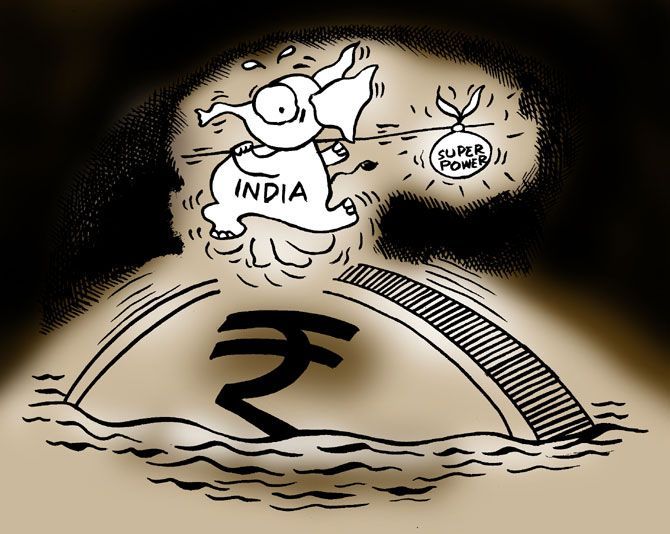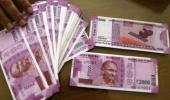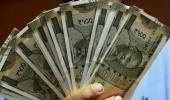The rupee has been under immense pressure due to a host of reasons including soaring crude oil prices, sustained foreign fund outflows and widening current account deficit.
Illustration: Uttam Ghosh/Rediff.com

The rupee's woeful run continued for the seventh straight session on Thursday as worries on macroeconomic economic front and rout in emerging market currencies pulled the Indian unit below the historic 72-level for the first time ever.
The domestic currency plunged to 72.11 to the dollar at one point during the day's trade before closing at 71.99, showing a steep 24 paise fall.
The rupee has been under immense pressure due to a host of reasons including soaring crude oil prices, sustained foreign fund outflows and widening current account deficit. Besides, escalation in global trade war tiff too weighed on sentiments.
But primarily it was weakness in emerging market currencies overseas which boosted the dollar, resulting in a duress for the domestic currency.
 "Markets are expecting some support from policy makers in terms of a separate window for OMCs and more relaxation on buyers credit and ECB guidelines. RBI intervened at various levels but was not very effective to contain the (rupee) movement," Sajal Gupta, Head Forex and Rates, Edelweiss Securities Ltd, said.
"Markets are expecting some support from policy makers in terms of a separate window for OMCs and more relaxation on buyers credit and ECB guidelines. RBI intervened at various levels but was not very effective to contain the (rupee) movement," Sajal Gupta, Head Forex and Rates, Edelweiss Securities Ltd, said.
After a positive start in early trade, the beleaguered rupee crumbled to breach the 72-mark for the first time ever. It had opened higher by 13 paise at 71.62 per dollar.
The domestic currency has been caught in a free fall for last few sessions against the backdrop of surging global oil prices and consistent widening of trade deficit.
However, RBI's intervention operations to contain volatility in the forex market remained elusive.
The Indian rupee continues to be worst performer among Asian currencies, having weakened by almost 13 per cent since the beginning of the year.
The domestic currency has been under immense pressure ever since international crude prices crossed the significant $70 per barrel mark.
Adding to pressure point, the 10-year G-Sec yield maintained its steady uptrend on fear of more rate hikes and touched multi-year high of 8.06 per cent.
International oil price, which is rallying on the back of geo-political tensions and supply woes, may continue to remain a near-term concern for India's trade balance, leading to further erosion in the rupee value.
India's current account deficit (CAD) has been deteriorating since the last fiscal.
The brewing crisis has seen in a number of emerging market currencies -- mostly with deep current account deficits have taken a severe hammering in the recent wave of fear selling.
In contrast, domestic bourses staged a spirited recovery amid fears of broader contagion from the sell-offs.
Crude prices recouped overnight losses, driven by a weaker dollar and evidence of strong US fuel demand, though demand prospects remain clouded by the turmoil engulfing emerging markets and an escalation in the US trade dispute with China.
Benchmark Brent crude oil is trading at $77.46 a barrel in early Asian trade.
The Indian unit opened higher at 71.62 against the last close of 71.75 at the inter-bank foreign exchange (forex) market on bouts of dollar selling by state-run banks.
But, it immediately retreated to break multiple days of a record low.
The local unit hit a fresh intra-day low of 72.11 in mid afternoon deals, before ending the day at 71.99.
The Financial Benchmarks India private limited (FBIL), meanwhile, fixed the reference rate for the dollar at 71.9214 and for the euro at 83.6005.
In the cross-currency trade, the rupee tumbled against the pound sterling to end at 93.08 per pound from 91.95 and dropped against the euro to finish at 83.70 as compared to 83.12 on Wednesday.
It also fell back against the Japanese yen to close at 64.69 per 100 yens from 64.29.
Globally, the US dollar was steady against major trading currency baskets as concerns over global trade tensions and recent turmoil in emerging markets supported safe haven demand for the greenback.
Against a basket of other currencies, the dollar index is down at 94.96.
In forward market today, premium for dollar declined owing to mild receiving from exporters.
The benchmark six-month forward premium payable in January 2019 eased to 122-124 paise from 123-125 paise and the far-forward July contract also softened to 275.50-277.50 paise from 276-278 paise.










